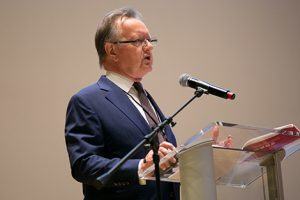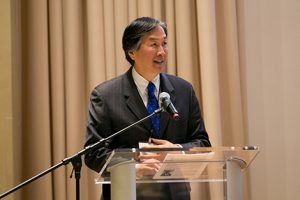April 28, 2016 — Every company has a “public health footprint,” according to John Quelch, a professor at Harvard T.H. Chan School of Public Health and Harvard Business School (HBS). It can be seen in the ways that companies help—or hurt—the health and well-being of the public through their products and policies. At a recent conference he co-chaired, Quelch explored whether companies can improve their footprint for the benefit of society—and their bottom line.
Building a Culture of Health: A New Imperative for Business, co-sponsored by Harvard Chan, HBS, and the Robert Wood Johnson Foundation (RWJF) and held April 18–19 at HBS, aimed to set a new research agenda around promoting health as a corporate value. The invitation-only event attracted approximately 300 business, policy, and academic leaders.
“The energy at the conference was tremendous,” said event co-chair Howard Koh, Harvey V. Fineberg Professor of the Practice of Public Health Leadership at Harvard Chan. “This type of discussion rarely happens. There was a real eagerness to do more.”

Prior to the start of the conference, Quelch, who is a professor in health policy and management at Harvard Chan and the Charles Edward Wilson Professor of Business Administration at HBS, surveyed corporate attendees about their companies’ actions around what he identifies as the four dimensions of the public health footprint: consumer health, employee health, community health, and environmental health. Overall, companies rated progress strongest in employee and environmental health measures, he said. They have to do more work to improve their footprints in consumer and community health.
This debate provided some of the conference’s most productive and enlightening moments, Quelch said. Several corporate speakers were challenged to do more by fellow panelists from public sector or consumer advocacy organizations. “Those are very legitimate conversations, and it was fascinating to see them play out on the panels,” Quelch said.

Koh described the conference as a first step in what will likely be a long-running research agenda. He and Quelch, along with John McDonough, professor of the practice of public health, are co-principal investigators on a grant from RWJF to explore building a culture of health. They intend to hold another, more interactive conference next year, and also launch new executive education courses for business leaders. Future research will include looking at the metrics that companies with a strong public health footprint are using to demonstrate a total return on investment across the four dimensions.
Koh cited the CVS pharmacy chain’s move to ban tobacco sales as a positive example that was raised at the conference. The ban was implemented in 2014 as part of the company’s rebranding as CVS Health. Sales grew the following year, according to Forbes, with the loss of tobacco revenue offset in part by the company’s expanded primary health care service offerings.
“Businesses are in and of the community,” said Koh. “If you take care of your employees, if you are careful about the health impact of your consumer products, if you try to be stewards for your environment, and you try to advocate on behalf of your community, that should be good for your business. A theme that we heard at this conference was that this should be how all businesses are run. That’s the hope and dream.”
Photos: Evgenia Eliseeva
Read more
Building bridges between public health and business (Harvard Chan News)
